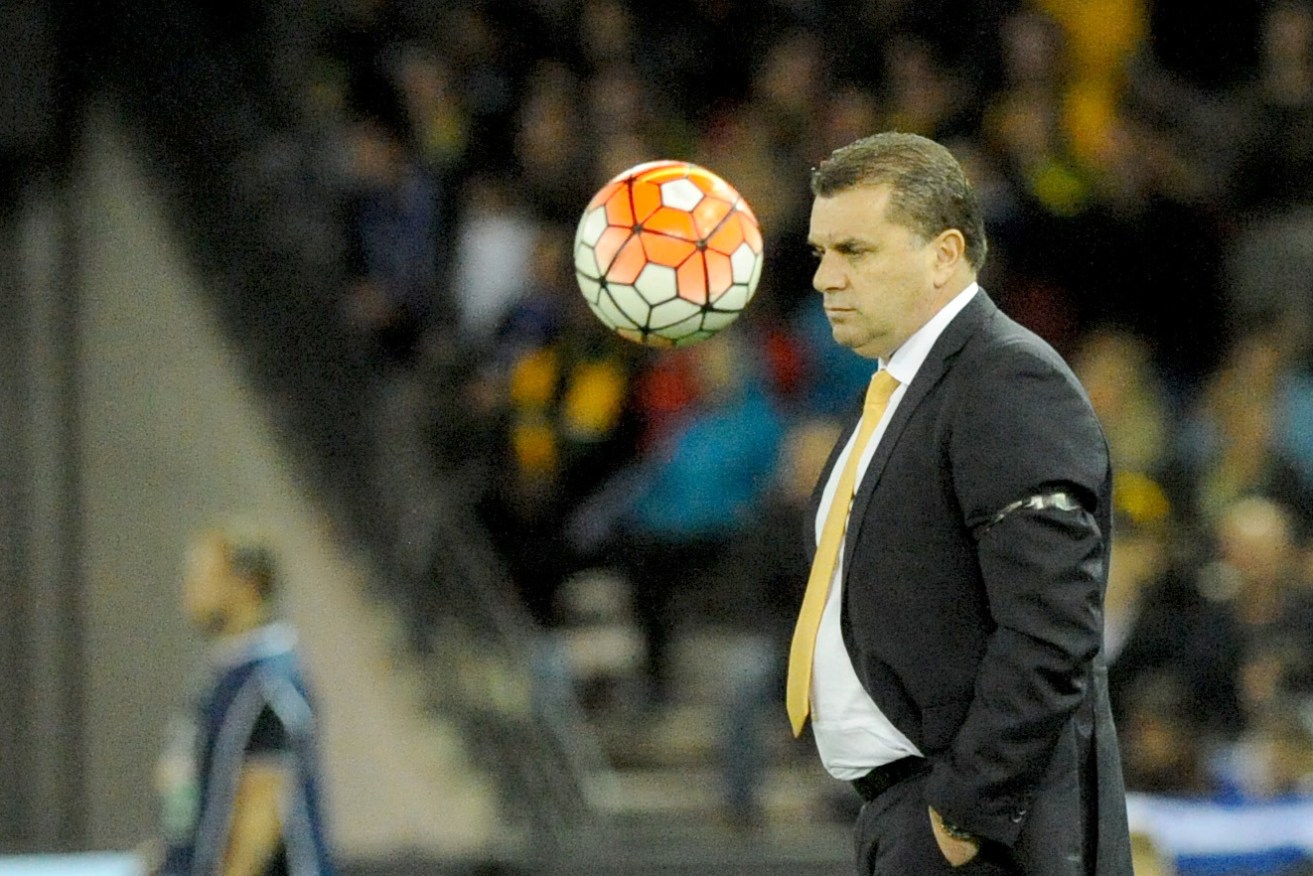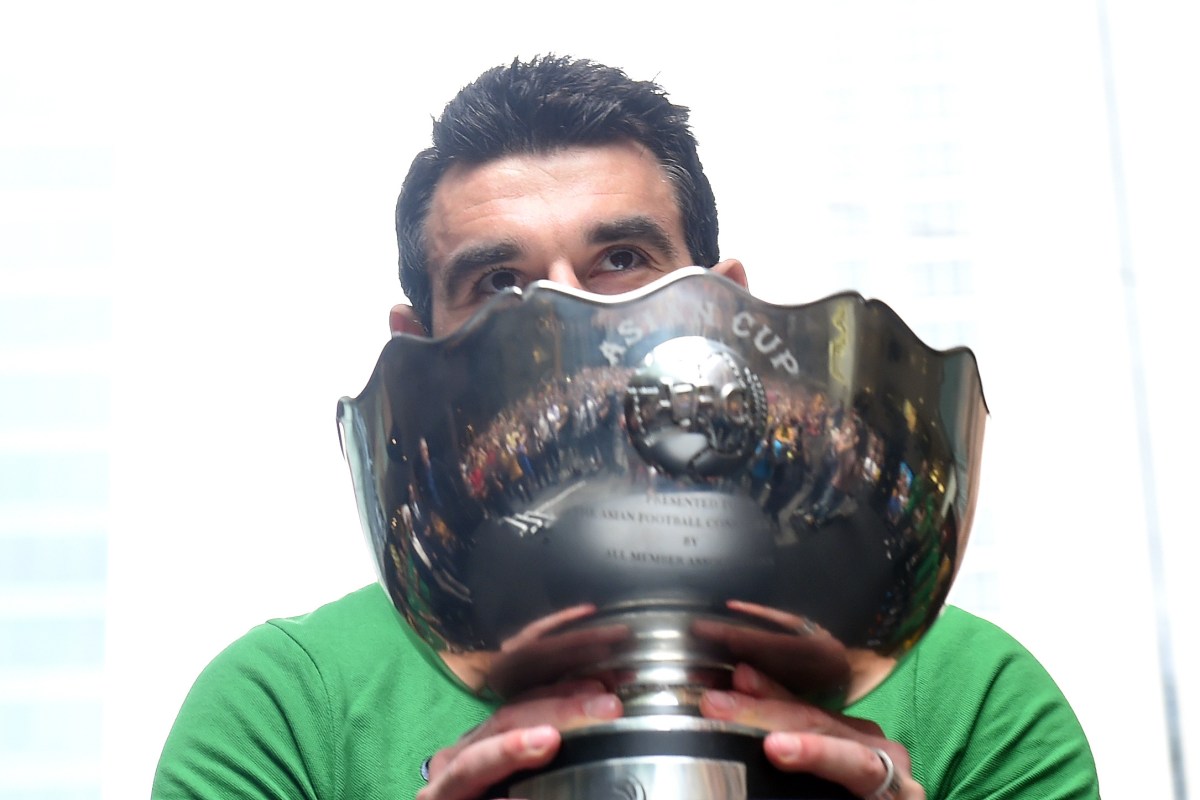Manton St Tales: The unfriendly truth behind the Socceroos’ place in the world
Despite high-profile successes on the field, of the Asian-grouped nations in the official FIFA rankings the Socceroos remain mired behind Iran. Australia’s soccer governors may feign disbelief but, as Paul Marcuccitti argues, they may have been the architects of their own predicament.

EYES ON THE BALL: Socceroos coach Ange Postecoglou watches on during a recent friendly against Greece... but do such showcase matches hurt our FIFA ranking? Photo: Joe Castro / AAP
There are two distinct conversations I remember having in the mid 1990s when most people around me began connecting to the internet.
In one, a quasi-intellectual acquaintance offered that it was “the end of the great lie”. He reasoned that, with the truth out there, and easily accessible to everyone, the public would no longer be deceived by myth and fabrication.
A friend who was working at a university (and was connected in her office before I was at home) was closer with her description – that it was like having an encyclopedia at your fingertips.
I often have cause to remember these comments – the naïve prediction that was both hopeful and hopeless, and the one that proved to be correct, even if it would be just a small part of the internet’s story.
In the world of association football, one of the rituals that mocks any idea that the internet ended any lies is the release of FIFA rankings.
And it’s not because they tell untruths (though they are certainly flawed), it’s because people tell untruths about them.
Last week gave us the latest instalment. Though we’re in a part of the World Cup cycle in which rankings don’t matter much, Aussie fans mostly welcomed the Socceroos moving up to 45th in the world. Not brilliant but the highest position for some time.
In posting a story about the news, the official Socceroos Facebook page wrote: “We’ve achieved our highest ranking in four years. But how do we reach the top of the Asian nations?” (Iran is ranked above Australia.)
There were some good comments. I particularly liked: “Answer- Keep winning games. Answered your question guys, no need to thanks [sic] me.”
But we also got: “Play friendlies often vs teams we can easily beat. That pushes you up the rankings.” (which is incorrect) “Win the Asian Cup” (incorrect and sarcastic) and “Bribe FIFA?” (incorrect, sarcastic and hackneyed).
Of course the authors of those comments are the influenced, not the influencers. But for this subject, many of our sport’s cognoscenti have been more hindrance than help.
The column was a puzzling offering from the Socceroos’ website, which is run by Football Federation Australia. It included the following two paragraphs:
“Ange Postecoglou’s troops jumped a massive 12 spots when the rankings were released on Thursday to sit at no.45 in the world.
“But despite winning the AFC Asian Cup last year and making a perfect start to this phase of FIFA World Cup qualifying, Australia remain second highest in the AFC.”
None of that is incorrect, however, it omits most of the story.
Let’s start with the “despite winning the AFC Asian Cup” part.

Mile Jedinak holds the Asian Cup trophy – but winning it wasn’t enough to make Australia the top ranked team in Asia. Photo: Paul Miller / AAP
The rankings are decided by matches, not tournaments. For each game a team receives a certain number of ranking points (though it will be zero for a loss). Those points are then averaged over a twelve-month period. Results from the last four years count and they are divided into twelve-month periods so that the more recent ones can have a higher weighting than the older ones.
The Asian Cup was in January 2015 so its matches are no longer in the most recent year; the twelve-month period they’re in is now worth just 25 per cent of the total ranking. In that period (October 2014 – September 2015), the Socceroos played 14 matches and only six of them were in our region’s premier tournament. And they won just three of the other eight games.
So the Asian Cup’s contribution to Australia’s ranking points is about the same as six innings would be to the batting average of a cricketer who batted 50 times.
That “making a perfect start to this phase of FIFA World Cup qualifying” part certainly helped the Socceroos’ ranking but we’re only talking about two games – the recent wins over Iraq and United Arab Emirates. And they’re two matches of 10 the team has played in the current twelve-month period (which is worth 50 per cent of the total ranking).
While I doubt our sport’s governors would be too thrilled to hear it (or be reminded of it), decisions they make actually affect Australia’s ranking.
They are the organisers of friendly matches and, if you’ll allow me one more cricket analogy, those games are about as beneficial to your FIFA ranking as Glenn McGrath’s bowling was to Mike Atherton.
In fact the Socceroos would be ranked above Iran if they hadn’t played the friendly against England in May and the two against Greece in June.
Australia lost two of those three games and, without the affect they had on dragging the Socceroos’ ranking points down, the team would be 36th in the world … and top of all the Asian nations.
But even winning friendlies can be a negative. There are four numbers multiplied together to give a team its total ranking points for a particular game and one of them represents “importance”. A match at the World Cup tournament has an importance of 4; for a qualifier it’s 2.5; for a friendly it’s just 1.
So the amount of points you get from winning a friendly can lower your average; it will almost certainly do so if you’re also winning most of your qualifiers.
Wales and Romania understood this and beat the system by avoiding friendlies. FIFA Rankings are used to seed teams in Europe’s World Cup qualifying groups and, by ensuring their points came mostly from competitive games, those two countries boosted their positions enough to be seeded at the head of their groups (and at the expense of traditionally stronger nations who now have a tougher road to Russia 2018).
As I pointed out in February, Asia also uses rankings to decide seeds in World Cup qualifying.
Friendly matches have their uses: trying different players and tactics; promoting the sport; and earning federations some money.
Nevertheless, as rankings can be important, federations (including our own) should at least think about whether there are times when they’re better off not playing them.
I’d like to see the dodging of friendlies increase around the world because that might encourage FIFA to improve the system. It’s now been more than ten years since its last update.
To help that along, we need to have influencers embrace the encyclopedia part of the internet – explain more about the rankings system so that we can talk more about its flaws.
Rather than dangle clickbait as it did after last week’s release, FFA could play a part. Throw information about the system out there and encourage people to come up with a better way.
If the intervention of Faroe Islands can move FIFA on a rankings matter, why not Australia?
Paul Marcuccitti is a co-presenter of 5RTI’s Soccer on 531 program which can be heard from 10am on Saturdays.




